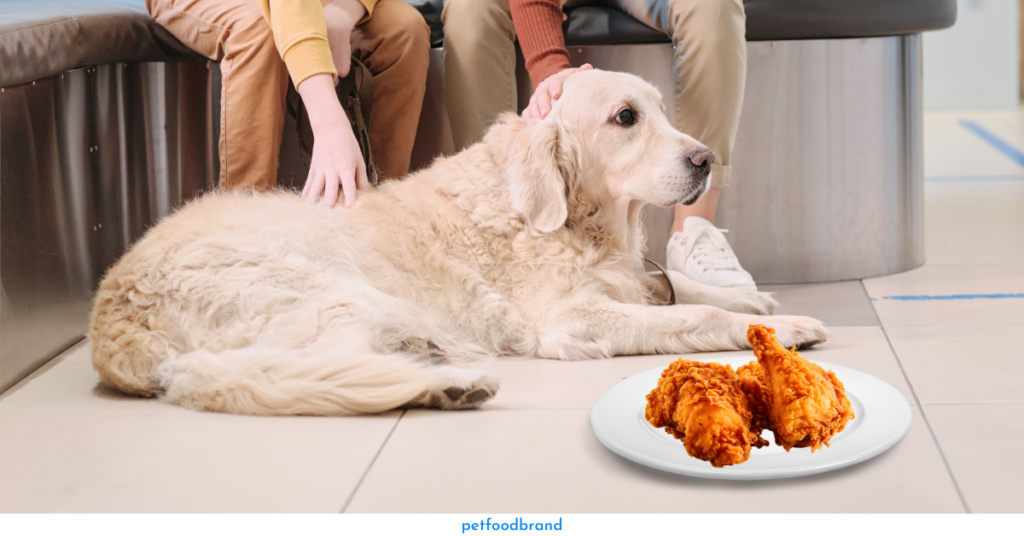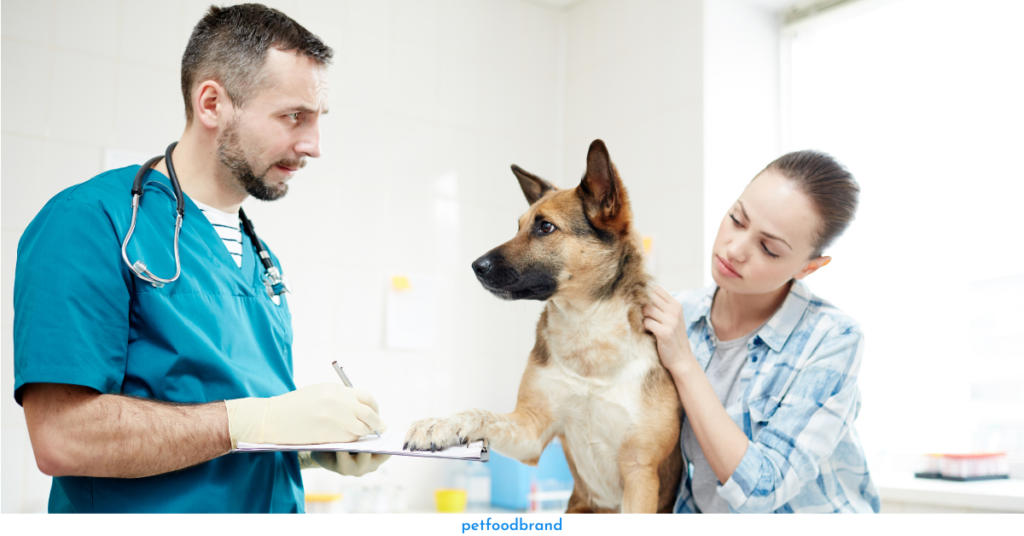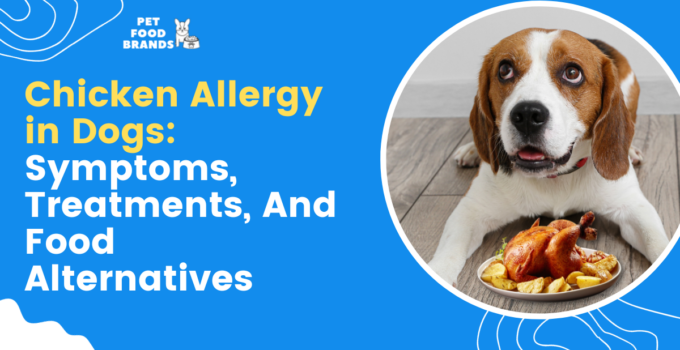Chicken Allergy in Dogs is definitely a concerned issue for you as a pet owner. Don’t worry it can be treated with the right strategies, medical interventions, and supportive care.
Chicken allergy in dogs can lead to a variety of symptoms. It can manifest into severe symptoms like skin irritations, gastrointestinal issues, and respiratory problems for your canine partner.
Some dogs may experience excessive itching and redness in their skin. Treatment options may include dietary changes, medications, strict avoidances, or immunotherapy.
Once you identify specific triggers and recognize the symptoms of allergies in your dog, you will be able to implement effective strategies to overcome them.
This article aims to provide you with all such information for the betterment of your canine partner.
Understanding Chicken Allergy in Dogs

Before delving into the symptoms and treatments, it is crucial to understand what causes chicken allergy in dogs.
Allergies occur when a dog’s immune system reacts to a specific protein or substance in chicken. The most common allergens in chicken are proteins like albumin and globulin, which can trigger an allergic response from a sensitive dog.
Chicken is a commonly used protein source in many dog food brands and is meant to provide nutritional value to dogs. However, sometimes, dogs may show an allergic reaction due to the consumption of this high protein source in chicken.
Some dogs are more prone to chicken allergies than others. Certain breeds, such as Retrievers, cocker spaniels, and Bulldogs, are more likely to develop allergic reactions to chicken consumption.
Additionally, Dogs with weakened immune systems or a history of different allergic reactions are at a higher risk of developing chicken allergy. Hence, understanding and addressing these allergies is crucial for the well-being of your dear canine.
Symptoms of Chicken Allergy in Dogs

Symptoms of Chicken Allergy in Dogs can vary from mild to severe. Recognizing those symptoms in your dog is essential for an early intervention. It is also important to seek proper veterinary care to provide relief for your furry companion.
In this section, we will shed some light on the common symptoms of chicken allergies in dogs so that it can help you prevent any severe allergic reactions in your dogs.
1. Skin Issues
Dogs with chicken allergies often develop intense itching, leading to excessive scratching, licking, and biting. Allergic reactions may also cause intensive redness and inflammation on their skin. You can spot rashes and hives developing on the upper surface layer of their skin, which is not at all good.
2. Gastrointestinal Problems
Chicken allergy can also affect a dog’s digestive system, leading to severe symptoms like vomiting, diarrhea, flatulence, and abdominal discomfort. Dogs may experience increased gas production in their tummies, which might affect their whole digestive system.
3. Respiratory Symptoms
Some dogs may exhibit frequent sneezing, coughing, or wheezing if they inhale chicken allergens. Dry coughing and throat asphyxiation are also plausible for your dog. Nasal congestion and difficulty breathing create a severe allergic reaction for your dog.
4. Chronic Ear Infections
Recurrent ear infections, often accompanied by a strong odor and discharge, can be linked to chicken allergies.
5. Behavioral Changes
Rapid changes in their behavior might occur due to chicken allergy.
Dogs might behave unnaturally, become moody, and look disturbed all the time. For example, they wouldn’t go out for walks or play as they normally do. This rapid behavior change could affect them psychologically.
6. Lack of Appetite
A lack of appetite is the most severe symptom of an allergic reaction. Not wanting to eat or swallow anything might affect their whole metabolism and digestive system.
7. Anaphylaxis
It is a severe allergic reaction that requires immediate medical attention. It can create a nauseating experience for your dog and can even be life-threatening for your dog.
It is essential to note that chicken allergy symptoms can take several hours and days to appear after consuming chicken or chicken-based products. Therefore, sometimes, it can be a little challenging to identify the cause of the allergy.
Treatment Options for Chicken Allergy in Dogs

Effective treatment of Chicken allergies in dogs involves a combination of avoidance strategies, medical interventions, and supportive care, as mentioned earlier.
Here are some of the important options:
1. Elimination Diet
Removing chicken or chicken-based products from your dog’s dietary routine is probably the most effective treatment option.
If your dog experiences severe symptoms of chicken allergies, remove all chicken-based ingredients from their food materials and replace them with other alternative choices like lamb or fish. Follow this routine for a week or a month to see the change.
That said, you should consult a veterinarian to help you decide the best diet for your dog.
2. Prescription Medications
Professional Dog Veterinarians may prescribe some antihistamines, corticosteroids, or other medications to alleviate itching, inflammation, and other gastrointestinal symptoms.
You need to do a diagnostic test of your dog to understand the severity of their reactions.
3. Immunotherapy
Allergen-specific immunotherapy can be an effective treatment option. The process involves administering an allergen mixture to allergic dogs to reduce or eliminate symptoms of chicken allergies. It also helps reduce subsequent exposure to the causative allergens found in dog foods.
Immunotherapy works by inducing small amounts of chicken allergen doses in the dog’s food pipe and then gradually increasing the tolerance level of their allergen deterrents, eventually making them fully immune to chicken allergies.
4. Good Hygiene and Cleanliness
Regular cleanliness and maintaining proper hygiene of your dog important to prevent any severe allergic reactions.
Cleaning your dog’s food and water bowls regularly will prevent any bacterial contamination. It’s also important that you keep your dog’s living environment clean to prevent any bacterial germs or dirt.
Food Alternatives for Dogs with Chicken Allergy

Dogs with chicken allergies require special dietary considerations to ensure they receive the necessary nutrients without causing an allergic reaction. Here are some food alternatives for dogs with chicken allergies:
1. Beef
Beef is a common alternative protein source for dogs with chicken allergies. It is a good source of protein, iron, and vitamin B-12.
Beef can be fed to dogs in various forms, such as raw, cooked, or dehydrated. However, some dogs may also be allergic to beef, so it is important to introduce it gradually and monitor for any adverse reactions.
2. Fish
Fish is another rich protein source that can be used as an alternative to chicken for dogs with allergies.
Fish is highly rich in omega-3 fatty acids, which are beneficial for a dog’s skin and coat health. Some popular Fish options for dogs include Salmon, Tuna, and Sardines. Some fish may, however, contain high levels of mercury. So, it is important to choose low-mercury fish options and limit the amount of fish proteins in a dog’s dietary routine.
3. Lamb
Lamb has a high myoglobin content, making it an iron-rich protein source. It is also an excellent source of Vitamin B-12; it is a rich nutrient that helps prevent megaloblastic anemia, a blood condition that can make your dog feel super sluggish, tired, and weak.
It is also considered an excellent natural source of essential amino acids vital for canine growth, a healthy immune system, muscle maintenance, and pulmonary as well as respiratory health for your Dog.
4. Whitefish
Whitefish is known for its high phosphorus content, which is known to help maintain good bone structure and density in healthy dogs.
Whitefish contains a high amount of vitamin B–vitamin B12, essential for healthy nerve function and the production of new red blood cells, and vitamin B6 (pyridoxine) for proper protein metabolism. While vitamin B3 (niacin) aids in energy metabolism and helps support the immune system. Plus, whitefish contains nutrients known to help promote healthy brain function.
5. Vegetarian Options
A vegetarian diet might be a suitable alternative for dogs with severe chicken allergies. Vegetarian diets for dogs typically consist of plant-based protein sources such as soy, lentils, and chickpeas.
It is important to ensure that a vegetarian diet for dogs is nutritionally balanced and meets their dietary requirements for proteins, fat, and other essential nutrients. That said, consult a veterinarian before switching to a vegetarian diet.
FAQ’s
Can a Dog Develop Chicken Allergy after Years of Eating Chicken?
Yes, Dogs can develop chicken allergies at any age, even if they consumed
chicken years ago.
They might have developed an allergic reaction to them due to hormonal changes or taste development in their salivary glands.
Are Chicken Allergies Common in Dogs?
Chicken allergies are not as common as some other allergies, but they do occur. Dogs can develop allergies to various foods, including chicken.
Can I Feed My Dog Homemade Foods to Avoid Chicken Allergies?
Homemade diets can be an option, but they must be well-balanced and formulated to meet your dog’s nutritional requirements for protein, iron, and vitamins.
It’s important that you consult a veterinary nutritionist before you decide on a dietary plan for your dog.
Conclusion
Chicken Allergies in dogs can be challenging. But your furry friend can lead a happily healthy life with proper diagnosis and effective treatment procedures.
Considering alternative protein food sources can be beneficial in treating your dog with allergic reactions to chicken.
Always consult a professional dog veterinarian for guidance on your dog’s specific needs.

Ankita is a passionate pet lover and head of content at Pet Food Brands. With her extensive knowledge and research, she provides pet owners with top-quality information on dog food and nutrition. Her dedication to improving the lives of dogs makes her a leading voice in the industry.




